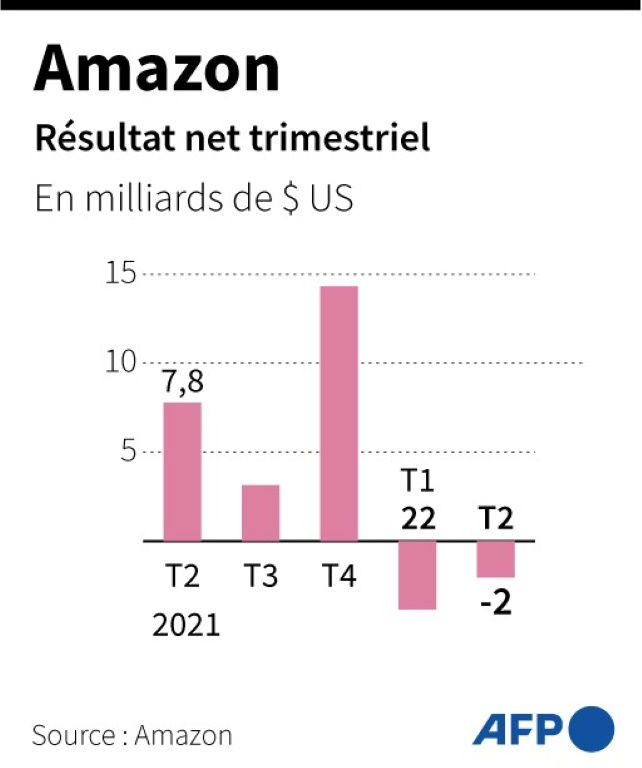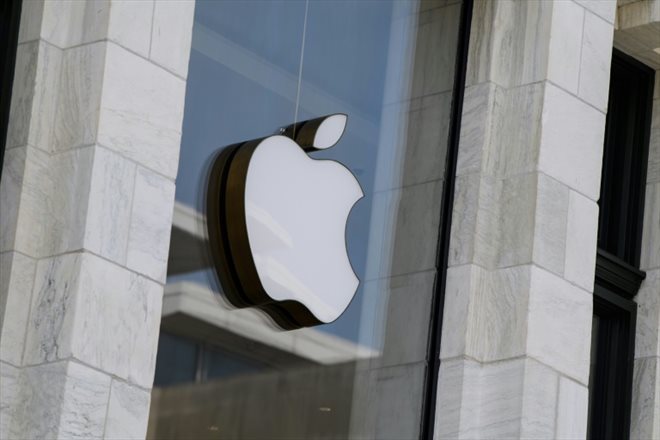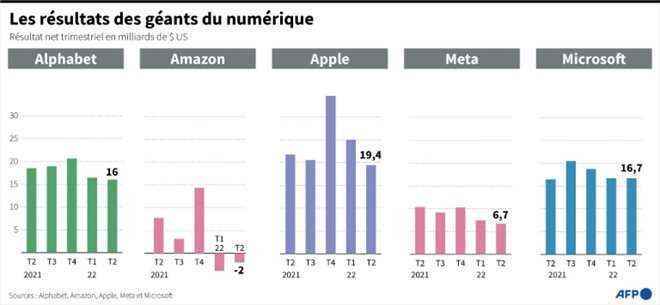Amazon and Apple reassured the market somewhat on Thursday with better-than-expected sales, after many disappointing performances from other tech companies battling the economic crisis (AFP/Archives/Patrick T. FALLON)
After two glorious years, the economic crisis has finally caught up with technology companies, especially social networks and large platforms which are facing the beginning of saturation.
Only Amazon and Apple reassured the market a little on Thursday with better-than-expected sales, thanks in particular to the success of their star products.
The e-commerce giant posted more than $121 billion in revenue in the second quarter, up 7%.
Its stock jumped more than 10% in electronic trading after the close of trading.
“Despite inflation driving up the price of fuel, energy and transportation, we are making progress on more controllable costs,” Amazon CEO Andy Jassy said in a statement Thursday.
AWS, its cloud service, world leader in remote computing, earned $ 19.55 billion in revenue (+ 33% year on year), but its online sales fell 4%, to 50.9 billion.

Amazon (AFP/John SAEKI)
And its operating profit – a key indicator of profitability – stood at 3.3 billion dollars, half of last year.
“It hasn’t been a golden quarter at all,” reacted Andrew Lipsman, analyst at insider Intelligence. “E-commerce business is struggling to return to positive growth, and AWS and advertising are slowing.”
– The still popular iPhone –
Apple on Thursday released quarterly revenue above expectations (83 billion, up 2%), thanks to still strong demand for the iPhone.

Apple posted quarterly revenue above expectations on Thursday thanks to continued strong demand for the iPhone (AFP/Archives/Nicholas Kamm)
Sales of Mac computers, iPad tablets and connected objects, on the other hand, fell.
The apple brand had warned in April that the closures of factories in China because of the Covid and the shortage of silicone necessary for the manufacture of chips were to deprive it of 4 to 8 billion dollars in turnover.
But these logistical disruptions “were less significant than expected”, assured the boss of the group, Tim Cook, during a conference call.
For the current quarter, Amazon and Apple are counting on stronger sales figures, despite the negative impact of exchange rate effects.
Intel had a harder time weathering the turmoil.
The American semiconductor giant saw its turnover fall by 22%, to 15.3 billion dollars and has largely revised its annual forecast downwards.
In question, according to the boss, Pat Gelsinger, “the sudden and rapid decline in economic activity”. He also mentioned “execution problems” during a conference call, particularly concerning product design.

Apple (AFP/Gal ROMA)
In a few months, the economic environment of the technology giants has deteriorated radically.
The health crisis and confinements have led to an explosion of online habits, from consumption to work and entertainment.
Today the digital transition continues – most platforms are gaining new users – but at a slower pace, comparable to that before the Covid-19 pandemic.
– “Doing more with less” –
Added to this phenomenon are numerous macroeconomic constraints, starting with inflation.

Meta headquarters in Menlo Park, California on October 28, 2021 (gETTY/AFP/Archives/JUSTIN SULLIVAN)
Google, Meta (Facebook, Instagram), Snap and Twitter, which depend on advertising, are therefore suffering from cuts in advertisers’ marketing budgets.
Amazon and Apple are dealing with somewhat reduced demand for certain products and difficulties in the supply chain.
The Seattle group, the second largest employer in the United States behind Walmart, has doubled its workforce from 2019 to 2021. It now has 1.52 million people, around 100,000 less than at the end of the first quarter.
Other tech companies have moved to slow the pace of hiring, like Google, Microsoft, and Snap. The e-commerce platform Shopify has thanked a thousand people, or 10% of the staff.
Netflix, which lost nearly a million subscribers between the end of March and the end of June, laid off more than 400 employees over the same period.
“We’re going to have to do more with less,” Meta boss Mark Zuckerberg said Wednesday after the social media giant saw its quarterly revenue decline for the first time in its history.
“Meta is losing its grip on its huge audience,” said Insider intelligence analyst Debra Aho Williamson.

The results of the digital giants (AFP/)
Social platforms are trying to stay ahead of the fierce competition from the TikTok app, which is very popular among teens and young adults.
Google posted the slowest year-over-year revenue growth rate since the second quarter of 2020, when advertisers abruptly closed the floodgates at the start of the pandemic.
© 2022 AFP
Did you like this article ? Share it with your friends with the buttons below.




